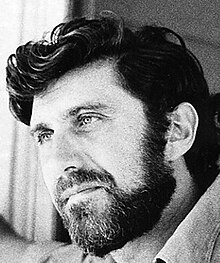
Back إليوت أرونسون Arabic اليوت ارونسون ARZ الیوت آرنسون AZB Elliot Aronson German الیوت ارنسون Persian Elliot Aronson French 엘리엇 아론슨 Korean Elliot Aronson Polish Аронсон, Эллиот Russian
Elliot Aronson | |
|---|---|
 Aronson in 1972 | |
| Born | January 9, 1932 |
| Alma mater | Brandeis University Wesleyan University Stanford University[1] |
| Known for | research on cognitive dissonance, high-impact experimentation, Jigsaw Classroom, gain–loss theory of attraction |
| Awards | AAAS Prize for Behavioral Science Research, APS William James Award |
| Scientific career | |
| Fields | Social psychology, applied social psychology, media psychology[1] |
| Institutions | Harvard University University of Minnesota University of Texas University of California, Santa Cruz |
| Doctoral advisor | Leon Festinger |
| Doctoral students | Merrill Carlsmith, John Darley, Anthony Greenwald, Alexander Gonzalez |
Elliot Aronson (born January 9, 1932) is an American psychologist who has carried out experiments on the theory of cognitive dissonance and invented the Jigsaw Classroom, a cooperative teaching technique that facilitates learning while reducing interethnic hostility and prejudice. In his 1972 social psychology textbook, The Social Animal, he stated Aronson's First Law: "People who do crazy things are not necessarily crazy", thus asserting the importance of situational factors in bizarre behavior. He is the only person in the 120-year history of the American Psychological Association to have won all three of its major awards: for writing, for teaching, and for research.[3] In 2007, he received the William James Award for Lifetime Achievement from the Association for Psychological Science, in which he was cited as the scientist who "fundamentally changed the way we look at everyday life".[4] A Review of General Psychology survey, published in 2002, ranked Aronson as the 78th most cited psychologist of the 20th century.[5] He officially retired in 1994 but continues to teach and write.[6]
- ^ a b Sheehy, Noel; Chapman, Antony J.; Conroy, Wendy A. (1997), "Aronson, Elliot", Biographical dictionary of psychology, Taylor & Francis, pp. 23–24, ISBN 978-0-415-09997-4
- ^ Cite error: The named reference
autobiogwas invoked but never defined (see the help page). - ^ Gonzales, Marti Hope; Tavris, Carol; Aronson, Joshua (2010), "Editor's Introduction", in Gonzales, Marti Hope; Tavris, Carol; Aronson, Joshua (eds.), The scientist and the humanist: A Festschrift in honor of Elliot Aronson, New York: Psychology Press, pp. 7–8, ISBN 978-1-84872-867-7
- ^ William James Fellow Award – Elliot Aronson Archived 2016-03-03 at the Wayback Machine (Association for Psychological Science) Accessed 2009-07-19
- ^ Haggbloom, Steven J.; Warnick, Renee; Warnick, Jason E.; Jones, Vinessa K.; Yarbrough, Gary L.; Russell, Tenea M.; Borecky, Chris M.; McGahhey, Reagan; et al. (2002). "The 100 most eminent psychologists of the 20th century". Review of General Psychology. 6 (2): 139–152. CiteSeerX 10.1.1.586.1913. doi:10.1037/1089-2680.6.2.139. S2CID 145668721.
- ^ Zimbardo, Philip (2010), "Honoring Elliot Aronson", in Gonzales, Marti Hope; Tavris, Carol; Aronson, Joshua (eds.), The scientist and the humanist: A Festschrift in honor of Elliot Aronson, New York: Psychology Press, pp. 15–18, ISBN 978-1-84872-867-7
© MMXXIII Rich X Search. We shall prevail. All rights reserved. Rich X Search